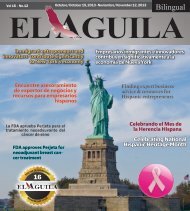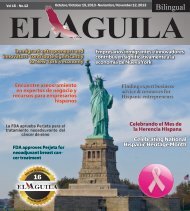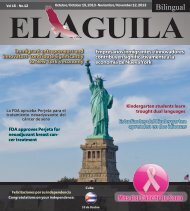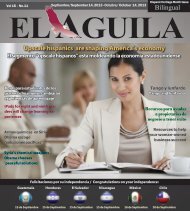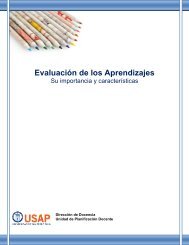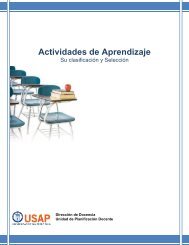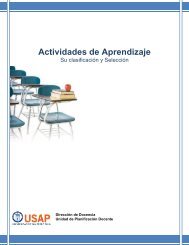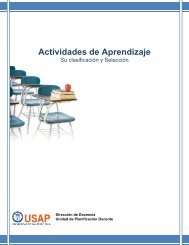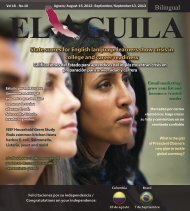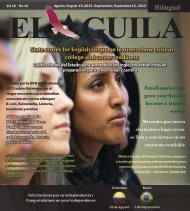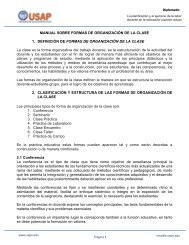REVISTA-AGOSTO-SEPTIEMBRE2013
You also want an ePaper? Increase the reach of your titles
YUMPU automatically turns print PDFs into web optimized ePapers that Google loves.
EL AGUILA<br />
4 Agosto/August 15, 2013 - Septiembre/September 13, 2013 EL AGUILA<br />
El Sueño Americano postergado: EE.UU.<br />
necesita arreglar su deteriorado sistema<br />
de enseñanza del inglés<br />
Por Sean Kennedy<br />
Perdidos en medio del bullicio por el debate<br />
sobre inmigración que está teniendo lugar en<br />
la nación se encuentran los intereses de 23<br />
millones de estadounidenses adultos que no saben<br />
hablar inglés adecuadamente.<br />
Aunque la mayoría de estos adultos son extranjeros<br />
de nacimiento (20 millones), otros 3 millones son<br />
ciudadanos nacidos en Estados Unidos, clasificados<br />
con una “Competencia Limitada<br />
en Inglés”. Y nuestro sistema de programas federales,<br />
que podría ayudarlos a aprender inglés, está<br />
seriamente deteriorado.<br />
El inglés les atañe a estos adultos. Para los<br />
latinos adultos, el domino limitado<br />
del inglés contribuye directamente<br />
a que abandonen los<br />
estudios y sufran una pérdida<br />
salarial de $3,000<br />
anuales - costándole a<br />
la economía de Estados<br />
Unidos un total<br />
de $38,000 millones<br />
anuales. Pero la<br />
competencia en<br />
inglés puede ser<br />
tan vital y básica<br />
como el que los padres<br />
puedan comunicarse<br />
con profesores<br />
y médicos acerca<br />
del bienestar de sus hijos:<br />
La gran mayoría de<br />
inmigrantes se sienten muy<br />
motivados para aprender inglés.<br />
En 2009, un estudio de la Contraloría General<br />
de Estados Unidos (GAO) halló que la enseñanza<br />
del inglés para adultos carece de un enfoque<br />
basado en datos empíricos. Según la GAO, el no<br />
tener que responder por la gestión conduce al fracaso<br />
- un fracaso que cuesta muchísimo a los contribuyentes<br />
así como a los estudiantes adultos, muy<br />
especialmente a los inmigrantes.<br />
¿Por qué no están funcionando estos programas?<br />
La culpa recae principalmente en los programas<br />
públicos diseñados para enseñar inglés: no satisfacen<br />
las necesidades de los estudiantes adultos que<br />
los cursan. Y puesto que el dinero público fluye independientemente<br />
de los resultados, si acaso los<br />
supervisaran, no hay incentivos para adaptar estos<br />
programas o adoptar mejores prácticas.<br />
Si los legisladores realmente tienen interés en la<br />
asimilación de los inmigrantes, deberían recurrir a<br />
mejores prácticas, en las que el sector privado<br />
y las organizaciones sin ánimo de lucro están siendo<br />
pioneros.<br />
A diferencia de los programas públicos, las organizaciones<br />
comunitarias tienen la obligación de responder<br />
por su gestión ante sus estudiantes y donantes.<br />
La implementación de buenos sistemas de res-<br />
ponsabilidad en la gestión, especialmente en lo que<br />
respecta a la fiabilidad de los datos, ha producido<br />
impresionantes resultados<br />
para muchas de estas organizaciones.<br />
Para organizaciones comunitarias sin ánimo de lucro<br />
como el Centro de Enseñanza Puente, de Los<br />
Ángeles, la base de su enfoque ha sido saber adaptarse<br />
a las necesidades de sus estudiantes. De acuerdo<br />
a su director ejecutivo, Luis Márquez: “Establecemos<br />
la situación de los alumnos evaluando sus<br />
habilidades, luego diseñamos un programa basado<br />
en sus puntos fuertes y apuntalamos sus capacidades<br />
para que vayan tan lejos y tan rápido<br />
como quieran”.<br />
El modelo de enseñanza<br />
Puente, denominado<br />
enseñanza híbrida,<br />
utiliza lecciones<br />
y evaluaciones<br />
informáticas<br />
flexibles que<br />
ayudan a multiplicar<br />
el efecto<br />
del empeño<br />
de los profesores<br />
de Inglés<br />
como Segundo<br />
Idioma (ESL) al<br />
proporcionarles<br />
datos útiles y puntuales<br />
para identificar<br />
las debilidades de<br />
los estudiantes y centrar su<br />
atención en ellas. Sólo en el año<br />
2005, el 85% de los estudiantes<br />
adultos de Puente mejoró su competencia en inglés,<br />
en comparación con el 40% como resultado<br />
promedio de los programas públicos de ese mismo<br />
año.<br />
Otro modelo prometedor es el de las escuelas chárter<br />
para adultos, como la Escuela Pública Chárter<br />
Internacional Carlos Rosario, de Washington D.C.<br />
El modelo de Rosario divide el plan de estudios en<br />
cursos de 10 niveles y los puestos se asignan según<br />
los resultados de rigurosas pruebas de competencia<br />
tanto en lectura como en escritura.<br />
Una vez asignados a un nivel, los estudiantes de<br />
Rosario reciben lecciones individualizadas y con<br />
objetivos determinados según sus necesidades y fines<br />
específicos, en contraste con los planes de estudios<br />
de modelo único que ofrecen los programas<br />
públicos.<br />
Sean Kennedy es investigador del Instituto Lexington,<br />
un centro de investigación sin ánimo<br />
de lucro con sede en Arlington, Virginia, y es<br />
co-autor del reciente informe, “Repairing The<br />
Nation’s Education System for Adult Learners”<br />
publicado en el mes de julio.<br />
The American<br />
Dream deferred:<br />
US needs to repair<br />
broken system to<br />
teach English<br />
By Sean Kennedy<br />
Lost amid the din of the nation’s immigration<br />
debate are the best interests of 23 million<br />
US adults who cannot speak English<br />
adequately. Although most of these adults are foreign-born<br />
(20 million), another 3 million are USborn<br />
citizens who are classified as Limited English<br />
Proficient.<br />
And our system of federal programs to help them<br />
learn English is badly broken.For these adults,<br />
English matters. For Latino adults, limited English<br />
directly contributes to dropping out of school and<br />
$3,000 in lost wages each year -- costing the US<br />
economy a total of $38 billion annually.<br />
But English proficiency can be as vital and basic as<br />
parents communicating with teachers and doctors<br />
about their child’s well-being: most immigrants are<br />
highly motivated to learn English.But according to<br />
the US Department of Education between 2007<br />
and 2010, only 40% of those enrolled in a government-funded<br />
or administered course improved<br />
their English proficiency.<br />
The remaining 60% either dropped out or did not<br />
advance. Most government programs do not even<br />
collect data on their effectiveness and where federal<br />
and state funds are spent.In 2009, a Government<br />
Accountability Office (GAO) study found that<br />
there is no evidenced-based approach to teaching<br />
English to adults. According to GAO, the lack of<br />
accountability in these programs leads to failure -- a<br />
failure that costs taxpayers and adult learners, especially<br />
immigrants, a great deal.Why aren’t the programs<br />
working? The blame falls primarily on the<br />
government programs designed to teach English<br />
--they don’t meet the needs of adult English learners.<br />
Since the government dollars flow regardless of<br />
outcomes, if they are even tracked, the programs<br />
have no incentive to adapt and adopt best practices.<br />
If lawmakers are keen to assimilate immigrants,<br />
they should look to best practices being pioneered<br />
in the non-profit and private sector.<br />
Unlike government programs, community-based<br />
organizations are held accountable by their students<br />
and donors. Well-implemented accountability<br />
systems especially reliance on data have produced<br />
impressive results for many of these organizations.<br />
Opinión<br />
Opinion<br />
Community-based non-profits like Los Angeles’<br />
Puente Learning Center have made accommodating<br />
its students the center of their approach. For<br />
CEO Luis Marquez, “We meet the learner where<br />
he or she is by assessing their skills, then design<br />
a program based on their strengths, and support<br />
their ability to go as far and as fast as they<br />
choose.”Puente’s instructional model called blended<br />
learning uses computer adaptive lessons and<br />
assessments help multiply the efforts of Englishas-a-Second<br />
Language (ESL) teachers by giving<br />
their useful and timely data to identify student’s<br />
weaknesses and focus their attention there. In 2005<br />
alone, 85% of Puente’s adult English learners advanced<br />
in proficiency compared to the government<br />
average of 40% that year.Another promising model<br />
is adult charter schools like Carlos Rosario International<br />
Public Charter School in Washington,<br />
DC.<br />
Under Rosario’s model, the curriculum is divided<br />
into 10 course levels where student placement is<br />
based on rigorous testing of both reading and writing<br />
proficiency.<br />
Once assigned to a level, Rosario’s students receive<br />
individualized and targeting lessons based<br />
on their specific needs and goals in contrast with<br />
the one-size-fits-all curriculum of governmentrun<br />
programs.Rosario incentivizes student learning<br />
further by offering workforce training programs<br />
to students once they reach a specified level<br />
of English proficiency including computer repair,<br />
culinary and nurse’s aide programs. The approach<br />
is working as 87% of Rosario’s students in levels<br />
1 and 4 passed their respective proficiency exams<br />
and advanced to the next level.<br />
Another crucial characteristic of adult charter<br />
schools like Rosario is accountability. If outcomes<br />
are insufficient, students will seek out better<br />
options. Moreover, oversight systems are in place<br />
to withdraw taxpayer dollars when a charter school<br />
no longer meets the needs of the community.Rosario<br />
and Puente are not alone as a myriad of non-profit<br />
and private sector organizations are achieving similar<br />
success in helping adult learners gain English<br />
proficiency.<br />
Policymakers should take heed -- these programs<br />
are built on accountability, rigorous data collection<br />
and most importantly a desire and flexibility to<br />
meet the adult learner where he or she is.Before further<br />
entrenching the government-run ESL system<br />
with more funding and mandates, policymakers<br />
must reform the broken system.<br />
Tax dollars should flow to community-based organizations<br />
that are achieving success. All Americans,<br />
especially English learners and immigrant<br />
communities, would be better off.<br />
Sean Kennedy is a fellow with the Lexington Institute,<br />
a non-profit think tank in Arlington VA and<br />
co-author of the recent report, “Repairing The<br />
Nation’s Education System for Adult Learners”



